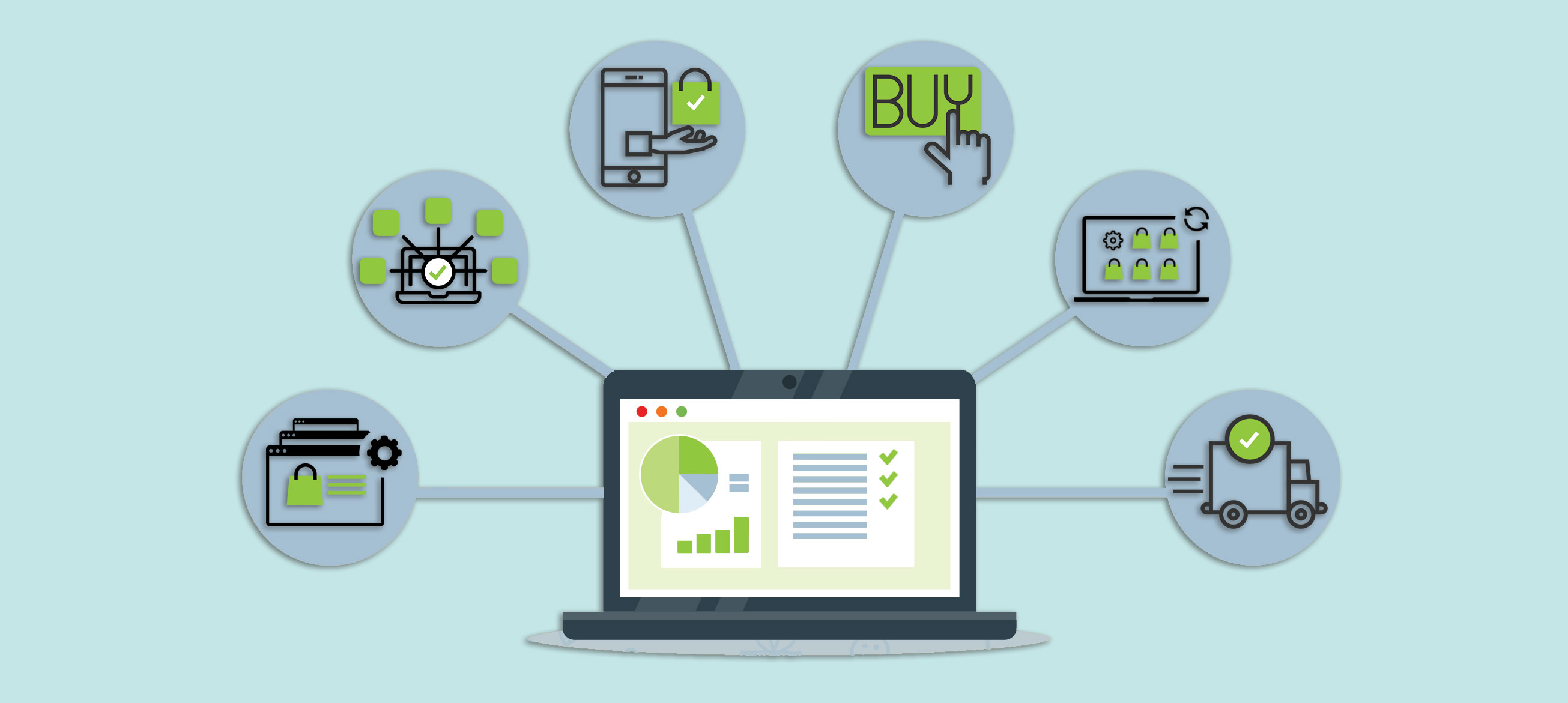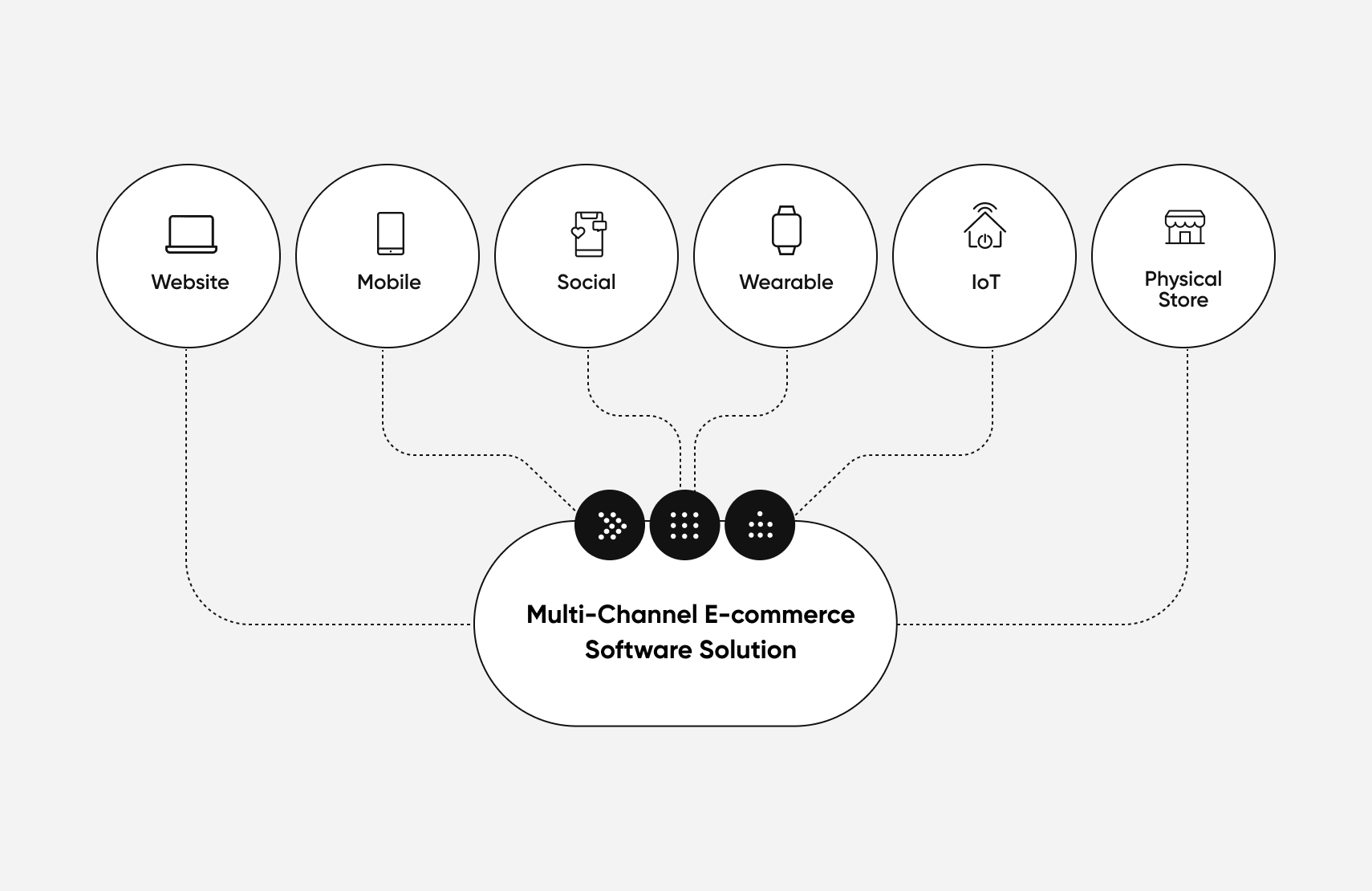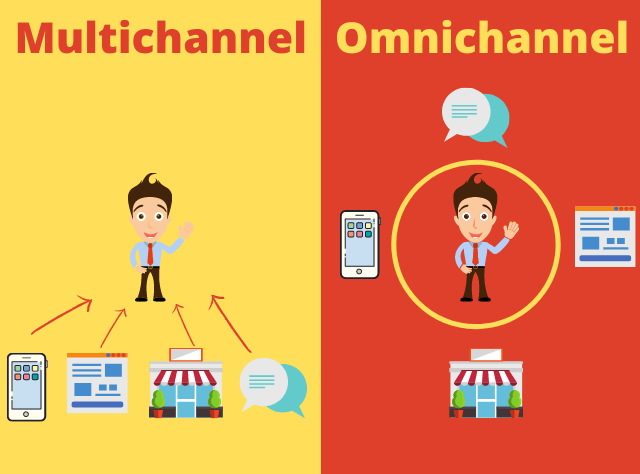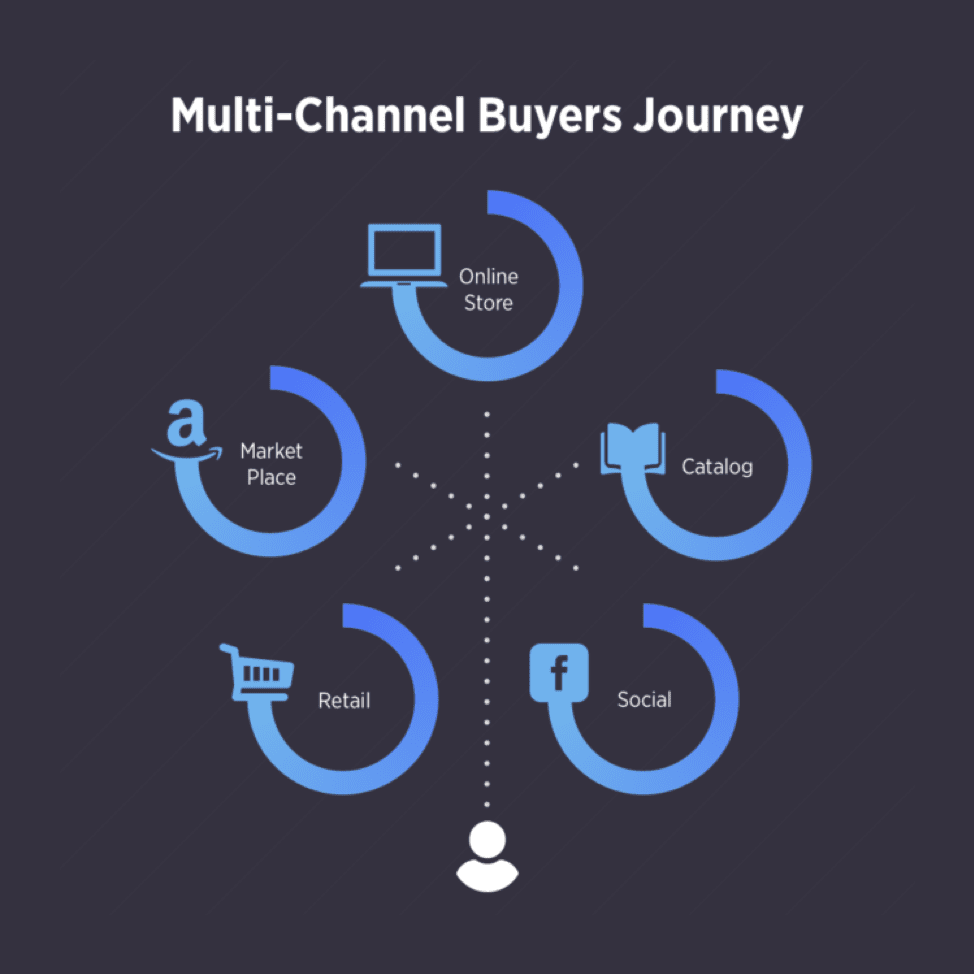7 min to read
Multichannel Ecommerce: An Effective Strategy for Brands to Increase Sales

multichannel commerce
Multichannel e-commerce entails putting into practise a marketing strategy based on all distribution channels at once in order to increase the number of points of contact for the company's audience. This may include online marketplaces, mobile applications, brick and mortar stores, conventional advertising campaigns, third-party distributors, etc.
The goals of multichannel e-commerce management include a more accurate assessment of sales issues, enhanced channel coherence that is in accordance with goals and internal communication guidelines, and a unified and harmonious approach to managing customer connections in a multichannel environment. After all, managing multiple sales channels can seem like a lot of extra work. But the truth is that a multi-channel strategy can be hugely beneficial for brands of all sizes. In fact, there are a number of reasons why you should consider expanding your business to include other sales channels.
CodeDesign is a leading digital marketing agency ranked #1 in Lisbon, Portugal. You could work with us to accelerate your business growth.
In this article, we'll take a look at the benefits of multichannel ecommerce and outline some of the key reasons why you should consider a multi-channel strategy for your business.
What Is Multichannel E-commerce?

What is multichannel commerce?
Multichannel e-commerce is the term given to the practice of selling products and services through more than one sales channel. This could mean selling products through your website, brick-and-mortar stores, marketplaces such as Amazon and eBay, and social media platforms such as Facebook and Instagram.
E-commerce has inevitably evolved into a multichannel industry as technology and consumer habits change. It is currently available both online and offline. Customers can access it both in the physical and digital worlds; in any case, they want to follow a consistent path while making purchases and gain from the best possible customer service.
The beauty of multichannel ecommerce is that it gives brands the opportunity to reach more customers and sell more products. By selling through multiple channels, brands can tap into different markets and target different audiences. This leads to increased brand awareness and a larger customer base.
"Successful omnichannel commerce relies on 3 key principles: seamless data integration, AI-driven personalization, and real-time inventory visibility. These enhance customer engagement and boost sales by tailoring interactions to consumer preferences, behavior, and context, ensuring effortless access to goods and services across channels." Cyril Dorogan, Chief Commercial Officer of Gepard,
The Benefits of a Multi-Channel Strategy

When it comes to multichannel ecommerce, there are a lot of benefits.
The more channels you can reach your clients on, the quicker you can convert a lead into a paying customer. It takes six to eight interactions with your customers to make a reliable transaction. Whether you run an e-commerce site or a brick-and-mortar store, using a multichannel marketing approach means you're regularly communicating with your customers on numerous channels, which makes it crucial for business growth. This tactic gives your customers the freedom to decide the time, channel, and the process they would prefer to purchase from you.
1. Expand your reach and customer base.
You have a better chance of reaching a larger audience when you provide your products through a variety of channels.
You can broaden your customer base based on demographics and purchasing patterns by using several channels. For instance, some customers prefer to make their purchases in person, while others spend a lot of time on social media and are therefore more inclined to do so online or through a social media app than in a physical store.
In addition to enabling you to reach a larger audience, selling through numerous sales channels gives you the chance to vary your product offering and cater to a range of demographics.With a multi-channel strategy, you're not limiting yourself to just one selling platform.
2. Improves your conversion rate.
When customers have multiple ways to buy from you, they're more likely to buy something. Why? Because it's convenient for them. They can buy what they want, when they want, and how they want. By providing more touch points for customers, you increase the chances that they will find your brand and make a purchase.
Having a multichannel presence also allows you to collect data from customers across all channels. This data can be used to improve your marketing and sales strategies, and ultimately increase conversion rates. Additionally, multichannel e-commerce can provide a more seamless experience for customers. This can help to build trust and loyalty, which can lead to higher conversion rates.
3. Multichannel strategy diversifies your risk.
A multichannel ecommerce strategy helps businesses to reach a wider audience and to diversify their risk. By selling products and services online, businesses can tap into new markets and reach new customers. Additionally, by selling through multiple channels, businesses can hedge their bets and reduce their reliance on any one particular sales channel. This diversification can help to protect businesses from risks associated with changes in consumer behavior or shifts in the marketplace.
And last but not least, a multi-channel strategy gets your brand exposure and credibility. When potential customers see that you're selling on multiple platforms, they'll trust you more and be more likely to buy from you.
Plus, it enhances the customer experience overall. Customers like having options, and they like being able to buy from wherever they are and however they want. Multichannel ecommerce gives them that flexibility.
How to Create a Multichannel Strategy?

Multichannel Strategy
Utilizing as many channels as you can is the fundamental tenet of multichannel marketing. You must choose the channels you'll employ for multichannel campaigns carefully and after weighing their benefits and drawbacks and analye which channels combine well for your audience.
First, decide what customer group you wish to target with your campaign. Do some research and determine which channels they're most likely to be using. Once you've chosen the appropriate channels, create a consistent messaging template—a good strategy must provide users with a similar experience, no matter the channel.
Once you've created your template, use analysis tools to track your customers' reactions and their general interest in the campaign. This will help you determine whether or not the campaign is working and whether or not you need to make any changes.
Finally, de-silo your channels before taking any cross-channel measures. This will ensure that your customers have a seamless experience no matter how they choose to shop with you.
One of the major difficulties with multichannel marketing is maintaining your branding and messaging. It's crucial to maintain consistency throughout all of your platforms, not just your website and social media accounts. Check the specifications of the channels you intend to employ so you may modify branding and messaging to comply with specifications and maintain consistency.
The Challenges of Multichannel Ecommerce
The first challenge is providing a cross-channel service. Customers expect a consistently high quality of service, regardless of which sales channel they choose. This means that you need to have the same level of customer service across all your channels, and that can be difficult to manage.
Another challenge is presenting your products in a unified way. Customers expect to find the same products on your website as they do in your brick-and-mortar stores, and they expect the presentation to be consistent across all channels. If there are discrepancies, it can lead to customer confusion and dissatisfaction.
Product availability is another challenge. You need to make sure that you have enough stock to meet the demand from all your sales channels. If you run out of stock in one channel, it can lead to disappointed customers and lost sales.
A lack of resources is often a bottleneck in multichannel ecommerce businesses. You might not have enough staff to handle the demand from all your sales channels, or you might not have the technology in place to support multiple channels. This can lead to frustration for customers and lost sales.
And finally, there's the risk of conflict between different channels. For example, if you're running a sale in your brick-and-mortar store, that sale might not be available online or vice versa. This can lead to customer confusion and dissatisfaction.
How to Overcome the Challenges of Implementing a Multichannel Ecommerce Strategy?
When it comes to implementing a multichannel ecommerce strategy, there are a few key challenges you'll need to overcome.
The first is that your branding and messaging will need to be adjusted for each channel, but still come out as consistent. Why? Because each channel has its own requirements and your customers will respond differently to your branding and messaging on each one.
The second challenge is making sure that your inventory is updated across all channels. This can be tricky, but thankfully there are a few great tools out there that can help make the process a lot easier, like Google sheets, Dropbox folders, and online catalogs.
The third challenge is creating a strategy for updating your branding and messaging all at once. This can be tricky, but it's important to make sure that your branding is consistent across all channels.
Finally, it's important to map out the customer journey so you can better understand how customers interact with your brand across different channels. By understanding their journey, you'll be able to better serve them and create a more seamless experience for them.
Conclusion
When it comes to ecommerce, brands that are successful go multichannel. A multi-channel strategy gives customers more opportunities to buy your products, and it also gives you more opportunities to connect with them.
There are a lot of benefits to having a multi-channel ecommerce strategy.
• More opportunities to sell your products – When you sell on multiple channels, you reach more potential customers.
• Greater customer convenience – Customers can buy your products wherever and whenever they want.
• Increased customer loyalty – When customers can buy your products in multiple places, they feel like they're part of a community. They're more likely to be loyal to your brand.
If you're not selling on multiple channels yet, now is the time to start. A multi-channel strategy is the key to success for any ecommerce brand.

About Bruno GavinoBruno Gavino is the CEO and partner of Codedesign, a digital marketing agency with a strong international presence. Based in Lisbon, Portugal, with offices in Boston, Singapore, and Manchester (UK) Codedesign has been recognized as one of the top interactive agencies and eCommerce agencies. Awarded Top B2B Company in Europe and Top B2C company in retail, Codedesign aims to foster personal relationships with clients and create a positive work environment for its team. He emphasizes the need for digital agencies to focus on data optimization and performance to meet the increasingly results-driven demands of clients. His experience in digital marketing, combined with a unique background that includes engineering and data, contributes to his effective and multifaceted leadership style. |

About CodedesignCodedesign is a digital marketing agency with a strong multicultural and international presence, offering expert services in digital marketing. Our digital agency in Lisbon, Boston, and Manchester enables us to provide market-ready strategies that suit a wide range of clients across the globe (both B2B and B2C). We specialize in creating impactful online experiences, focusing on making your digital presence strong and efficient. Our approach is straightforward and effective, ensuring that every client receives a personalized service that truly meets their needs. Our digital agency is committed to using the latest data and technology to help your business stand out. Whether you're looking to increase your online visibility, connect better with your audience, get more leads, or grow your online sales. For more information, read our Digital Strategy Blog or to start your journey with us, please feel free to contact us. |
CodeDesign is leading:
- Digital Agency
- Digital Marketing Agency
- Digital Ecommerce Agency
- Amazon Marketing Agency
Feel free to contact us to see the unprecedented growth of your business.

Add comment ×